Morality in Migration: A Review Essay (Global Justice Theory Practice Rhetoric 5 (2012), pp. 110-119)
Full Title: Morality in Migration: A Review Essay
Author: Luara Ferracioli
Type: Journal Article
Abstract
For as long as our world remains one in which states employ coercive force to guard their borders, and where prospective immigrants often risk their lives to cross them, immigration will remain a contested practical and moral topic. In recent decades philosophers have defended various answers to the question of whether states are morally justified, or act legitimately, when they stop foreigners from entering or acquiring membership of the state. Some have advocated a world of open borders, while others have defended the full sovereignty of states in matters of immigration. Christopher H. Wellman and Phillip Cole’s discussion in Debating the Ethics of Immigration and Ryan Pevnick’s Immigration and the Constraints of Justice are both valuable contributions to this body of literature.
Read this article here.
Author Bio
Luara Ferracioli was born in 1984 in Brazil. She completed a Bachelor Degree in International Relations in 2006, at the Universidade Curitiba. In 2007, she completed a Master in Arts at the University of Melbourne, Australia. She completed her PhD at the Centre for Applied Philosophy and Public Ethics, at the Australian National University in August 2011. Her research interests include gender, migration, multiculturalism and distributive justice. Her PhD thesis proposes a new model of migration that attends to the vulnerability of persons living in failed states. Most recently, she has also coordinated two national advocacy projects for the YWCA of Australia. In her post-doc she will focus on the brain drain of skilled workers and on the role of remittances in tackling global poverty.




